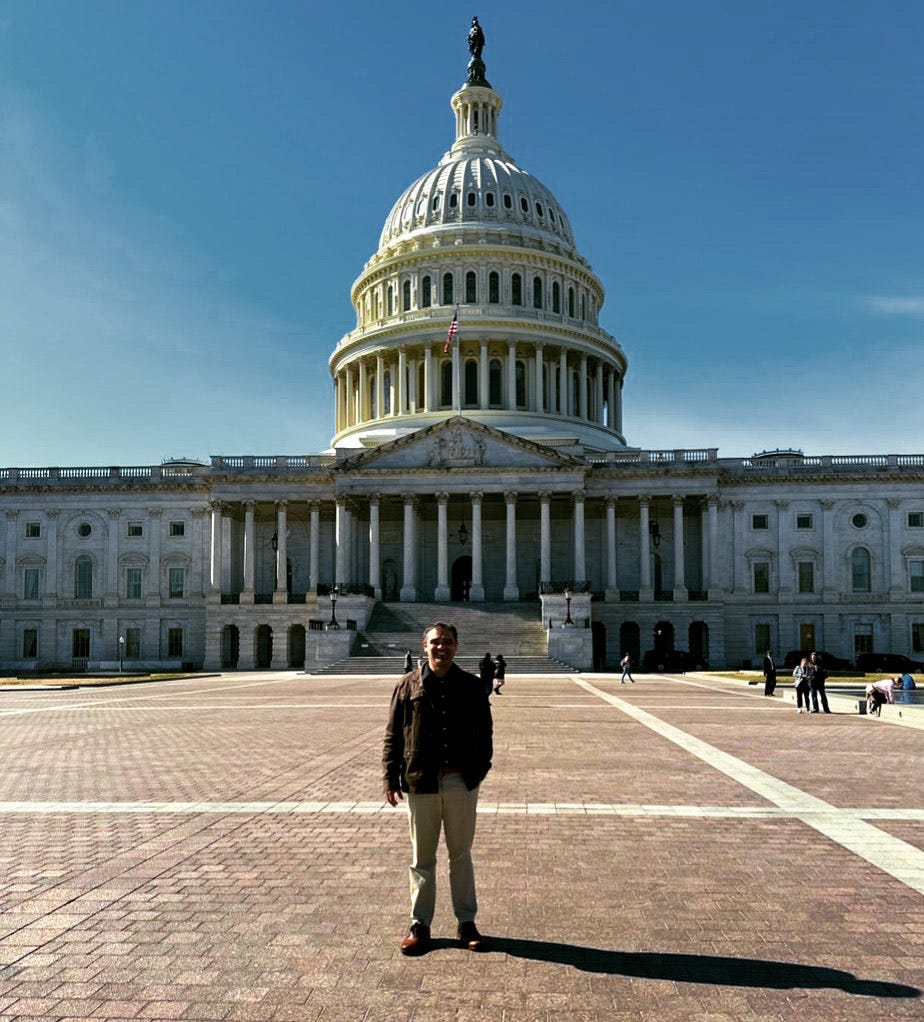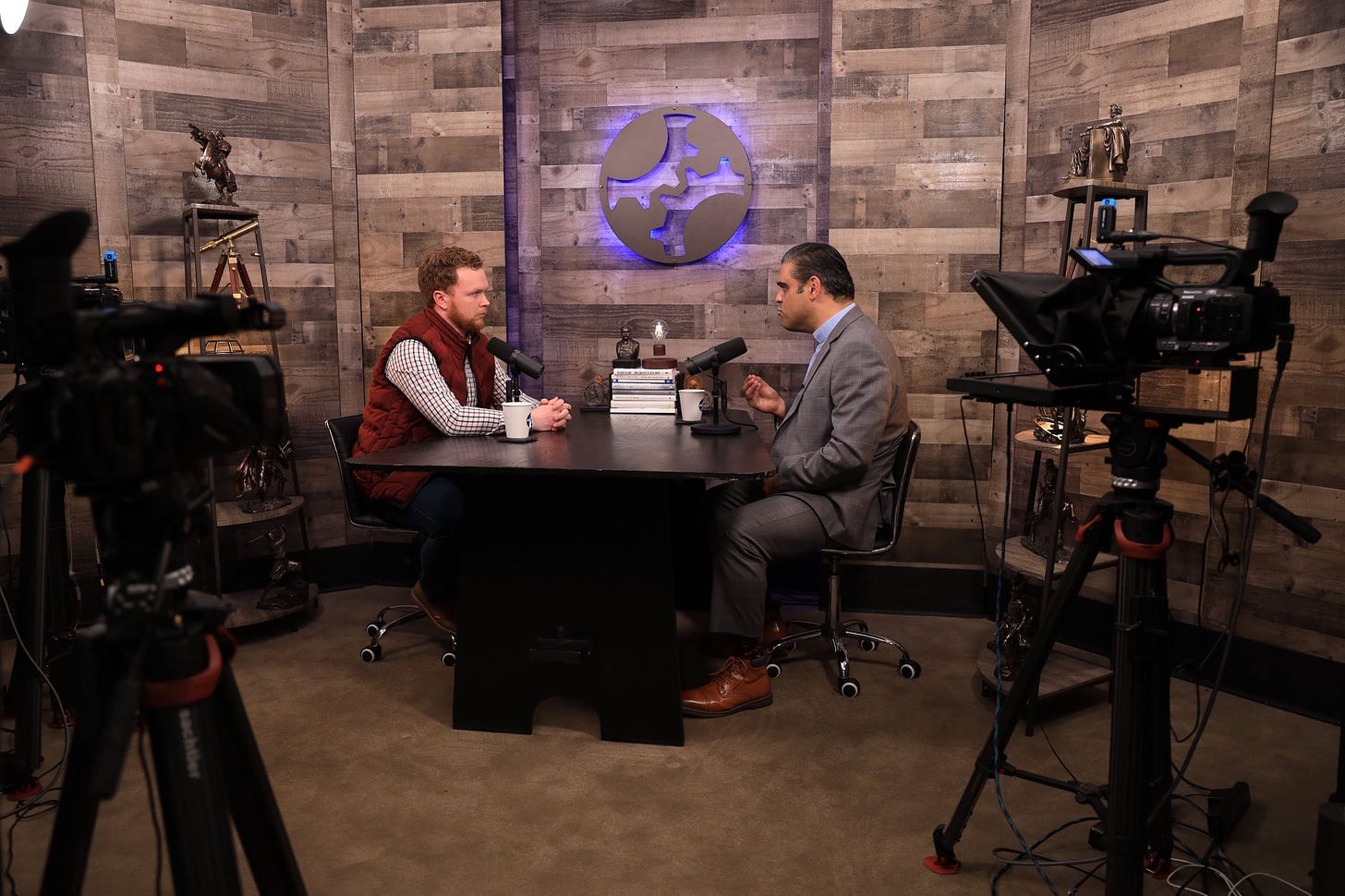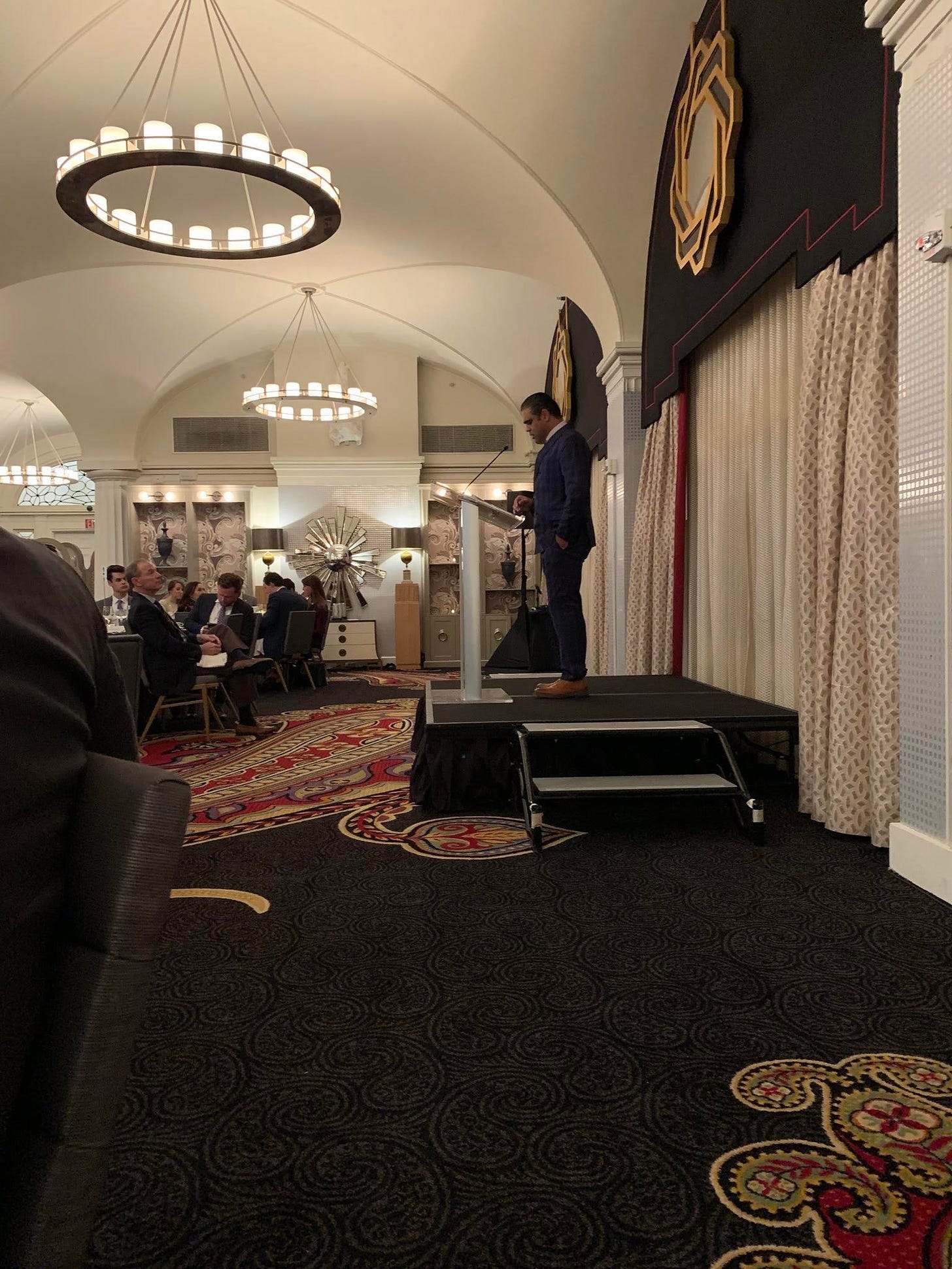These words come straight from Amish country in Pennsylvania. Should I open my windows, I would see land+land+land. It is wide-opened spaces everywhere you look and head-coverings adorning women's heads. I will return to this part of the journey in the next Perspectivalist.
In my last update, I was roaming New England waters—eight lectures in two days. Topics ranged from Jonah to Kuyper to Psalms. I happen to think all those topics are connected, and the audience was receptive and even added some notable observations that I hope to bring out next time.
I felt accomplished when I left the Boston Logan International Airport on February 14th. I knew the days ahead would be filled with eclectic dialogues, and I had the first part of my trip as evidence that I could repeat the feat of staying clear-minded and prepared to interact with a new set of hundreds of people.
The Politics of Change
My two-hour flight from Boston to D.C. was a sign of things to come. My flight was delayed a couple of hours, allowing me to put some finishing touches on my upcoming lectures. But when I boarded, I glanced at the person next to me to see what kind of serial killer I would engage in the next 120 minutes. There on top of his screen was “Call to Worship.” Underneath were familiar liturgical lines you’d expect to see in any standard service, and then I noted he was studiously going through his sermon notes. I quickly took the opportunity to ask whether he was a minister. He was. I asked whether he was Episcopalian since New England produced its share of non-believers. I am not saying that Episcopalians share common things with unbelievers. I am just implying it. But he was quick to let me know that he was a Congregationalist. The Congregationalists were already a thing by 1776 in this country, and he was in that line. Except, his concerns were not polity.
The Congregationalists of his variety had more noble concerns. For instance, this fella quoted the great Buddha and his eclectic wisdom in his homily. LGBT affirming wasn’t far enough. He needed a dose of that ancient idol. While our conversation had a bit of momentum, I had to order a Jack and Coke to get the taste out of my mouth and return to the task at hand.
By the time I arrived in D.C. I could smell duty ahead. I knew that the days ahead would be filled with new experiences. It was my first time in D.C., and everything looked stupendous. The buildings were magnificent, and every piece reminded me of an episode of The West Wing—departments of everything surrounded by security guards and brightened by beautiful sunny skies. It was the perfect introduction to this Brazilian boy. It really was hard to contain my emotions. Here I was at the very center of power—the power I have criticized in my populist work and have used as a paragon for filth. But yet, the place was stunning—power in the air, in the architecture, and the people.
I took an uber to the American Moment headquarters on Pennsylvania Avenue, just a few blocks from Joseph Biden’s opulent residence. The whole thing was surreal. I was greeted by the delightful Warren, who welcomed me with a big smile and took me upstairs to their abode. The AM is one of these institutions that do good and prepare young Americans to do good, serving in the staff of Senators, Congressmen, and other layers. I cannot commend their work enough and hope our paths cross again.
I initially came across their work through Nick Solheim, the Chief Operations Officer (COO) of American Moment. We met at #natcon 2022 in Miami. Nick is a young, energetic, visionary, and Reformed go-getter. This guy is a breath of fresh air, and his capability was evident. We spent the afternoon enjoying the sceneries of D.C. and acquainting myself with the environment. Everyone looks like they may be involved with something mysterious, which may be part of the place's charm—it evokes a sense of mysticism and conspiracism.
For example, I was seated next to what looked like a reasonably innocent fellow at the office. We chatted for a little and discussed living in D.C. He thought it was #**!&* and a few other choice words. In fact, every conceivable four-letter word was adverbial in his language. I discovered he was a prominent conservative voice with thousands and thousands of followers. I looked him up and saw his Instagram picture next to a Donald J. Trump. Yeah, D.C. is weirdly filled with these characters. Not all conservativism is created equal.
Speaking in D.C.
I had a couple of goals for my D.C. trip. The first was to be interviewed in the Moment of Truth Podcast. The second was to address a topic of great interest to me—the synergy between high ecclesiology and conservative politics.
The interview was delightful. The building where we recorded is the audio headquarters where politicians went to record their podcasts or do national interviews. I now have inside knowledge of the most obnoxious politician in that building. But that will cost a beer.
Nick Solheim was a great interviewer and kept the conversation rolling on all sorts of autobiographical, Kuyperian, and Nationalism topics. I am no originator. I am naturally a popularizer, so the conversation gave a good populist feel for where I stand on all things political. I let the academicians bore one listener at a time. The interview should be available in the next few days, and I hope to make it visible in upcoming Substacks.
Speaking of Substacks, I am taking my annual pilgrimage away from social media during Lent, so to keep up with my shenanigans, you will need to subscribe here in the slot above. Otherwise, see you on Easters.
The talk on Thursday evening was a great way to connect with some of the young D.C. staffers and meet some veteran operatives. The intersection between religion and politics is fascinating, and I have yet to find someone with more astute insights than the Dutch Theologian/Politician Abraham Kuyper. While I disagree on a few points, Kuyper was the apex of political theology in the 19th century. He builds on Calvin’s political inclinations and offers something lacking in our discourse. He offered coherence among spheres. He offered balance in an age of statism and ecclesiocracy.
The talk went quite well. My friend Lucas, who opened in prayer, observed that D.C. wasn’t ready, but they got it anyway. Lucas and I share the same worldview and believe that hard things need to be said even if they are not expected. Here is a sample of my talk entitled, An Ecclesial Conservatism:
Ecclesial theology fails if she succumbs to the pressures of individualism in its revolt against Christian orthodoxy. She will lose herself in endless woke agendas with endless interpretive guides and endless attempts to reconstruct the One, holy, Catholic, and apostolic Church. Instead, the Church perseveres by upholding the dogma established in the creation account. She must not operate in a temporary aloneness but in the newly established created order of the first community. Indeed, the Edenic image reshapes our ecclesial theology by reminding our twenty-first-century audience that God never intended that man be alone. He composed his masterful story in a context of a society committed to his call to be fruitful and multiply.
The conversation that followed at each table was a delight. It was good to hear the comments from many in attendance that there is indeed a need to recover the Church’s prophetic voice. Contrary to my expectations, I found a robust theology among the attendees and built some wonderful relationships with the young and old. I do hope they bear fruit in the long run.
It was also a delight to re-connect with friends from the #natcon world. Whether folks want it or not, the #natcon guys are changing much of the modern discourse, and we will need to find ways to build bridges to fight together. This piece by Toby Sumpter is a good start.
The following day I attended a panel and debate between Stephen Wolfe and Paul Miller on Christian Nationalism. While Stephen and I share a few different presuppositions, we are doomed if modern conservatives don’t affirm the necessity of an explicitly Christian nation. Stephen did well against the religion of neutrality espoused by Dr. Miller.
In the end, D.C. reminded me of the pillars of the Philistines. They have the appearance of power; they give off the vibe of fertility and virility, but ultimately, they are impotent and incapable of reproducing long-term. The one-maybe-two-kids average around there is proof of this.
The Church has a wonderful opportunity to influence that world and change the pillars of Dagon for renewed pillars built on the Church’s one foundation, Jesus Christ. Buddha’s wisdom offers no hope.
Epiphany Cheers on these closing days,
Rev. Dr. Uriesou Brito



